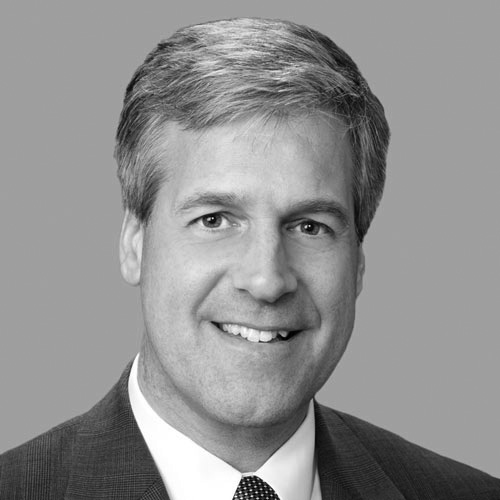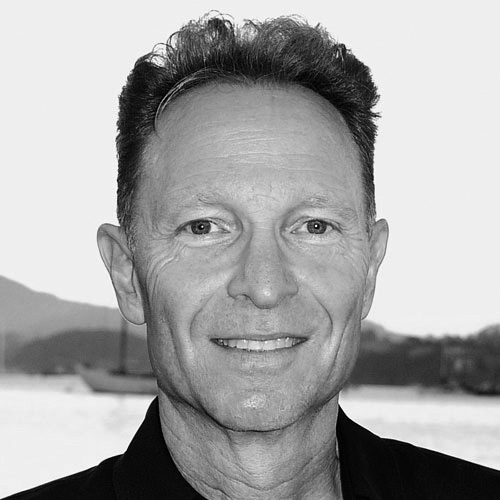Brian Larson was born in the snow-covered Upper Peninsula of Michigan to parents who highly prioritized their children’s education. That upbringing inspired Larson to excel in higher education at a prestigious school and to live in the warmest place in the United States. Eventually Phoenix, Arizona, became his destination, business became his focus, and soon he was considering law school.
After graduation, Larson became a tax manager, and after four years at an accounting firm he was one step away from making partner when he thought, “If I’m ever going to law school, I better do it now.” So he left his job for a free ride at Arizona State University where he started working his first year. “I had my own apartment, I rode a motorcycle to school every day, and I graduated with more money than I’d ever had,” Larson says. “Granted, it was probably only $10,000, but I got what I wanted.”
Larson began working at the largest law firm in Phoenix, counting himself among its more than two hundred lawyers. But the politics were exhausting and the administration was tedious, down to tracking every tenth of an hour of billable time. Still, Larson was successful and made partner in October of 1991—only to discover that there was even more administrative work at that level. “I was even more disenchanted with practicing law, and within a year decided that I should look for something else.”
In the mean time, Larson began pursuing the purchase of the biggest retail store for runners in Phoenix and had nearly completed the process when he decided that retail wasn’t the answer. “One of my partners told me about Boyd Gaming, and how wonderful it was to work there (he was the CEO at the time), and how Bill Boyd was the greatest guy.”
“I talk to our ceo on a daily basis. I know what’s going on and what he expects from me, and it’s a comfortable relationship.”
But Boyd Gaming, a leading casino entertainment company, was located in Las Vegas, which caused Larson some hesitation—it is Sin City, after all. He had just run the marathon trials for the 1992 Olympics on April 13, and his daughter was born two weeks later on April 30. “I didn’t want to raise my daughter in Las Vegas,” Larson says. “I had the same negative stereotypes that so many people still have.”
Curiosity eventually got the best of him, and Larson decided to discretely investigate. “I paid my own way, stayed in one of Boyd Gaming’s hotels, and I didn’t tell them I was coming,” Larson says. And he was surprised to discover the city was so much more than he had imagined. “There was no state income tax, the cost of living was less, it was smaller than Phoenix, and it had less traffic. It was so much more than the Strip.” So he interviewed and began as associate general counsel on March 1, 1993.
In June of the same year, Larson was instrumental in launching Boyd Gaming’s development program, and was named vice president of development in addition to his general counsel role. It was a particularly busy time in the industry as several states were opening up to gaming for the first time, so he traveled the United States to purchase new projects. “When I came to Boyd Gaming we had four properties in Nevada, and we now have twenty-two properties in eight states.” Larson has now been with the company for twenty-two years. “It has been a great experience. There is no doubt in my mind I will retire from here.”
Larson’s tenure actually only makes him the second most junior member of Boyd Gaming’s leadership. The management team’s seven members have more than 200 years of experience at Boyd Gaming combined. Perhaps even more notable is that over 50 percent of Boyd Gaming’s 24,000 team members have been with the company for more than ten years. “Our people are treated right,” Larson says. “They work together, pitch in to help each other, and there are very few politics.”
Boyd Gaming’s company culture is centered on integrity and teamwork, and it starts at the very top. “Bill Boyd is literally the nicest human being I have ever met,” Larson says, describing the organization’s founder. “I could tell you stories for hours about things he has done, not just for me, and not just for senior staff, but for so many people down the line.” At eighty-three years old, Bill Boyd continues to function as executive chairman. It was Boyd who set the precedent for collaboration and lucid communication on all levels. “I talk to our CEO on a daily basis,” Larson says. “I know what’s going on and what he expects of me, and it’s a comfortable relationship. The culture is definitely what has kept me here through the years. I’m confident I won’t find a place like this anywhere else.”
Even in such a stellar environment, practicing law in the gaming industry can be challenging. “It is highly regulated—so much more intense than any other industry,” Larson says. Any given day could include strategic planning, shareholder meetings, management committee responsibilities, acquisitions, and litigation. Change is constant, and flexibility and adaptability is key— as is Boyd Gaming’s supportive team atmosphere.
Boyd Gaming’s legal team is made up of six attorneys in Las Vegas, one in Louisiana, five paralegals, and a separate general counsel that handles the Borgata Hotel Casino and Spa in Atlantic City, New Jersey, which is owned fifty-fifty with MGM Resorts International. “I’ve been lucky to have a great team with several specialty areas that works well together,” Larson says. “We trust each other, and you can’t get better than that.”
Yet he didn’t predict this career path. “If you had told me a year before I started at Boyd Gaming that I would leave Phoenix to move to Las Vegas and work in the gaming industry, I never would have believed you,” Larson says. But he admits taking a chance on the gaming industry was worth it. And while it may not have happened exactly the way he imagined, Larson achieved his goals of excelling in education and making a home in one of the warmest places in the country. He played a strong hand well and, as he says, has certainly hit the jackpot.

